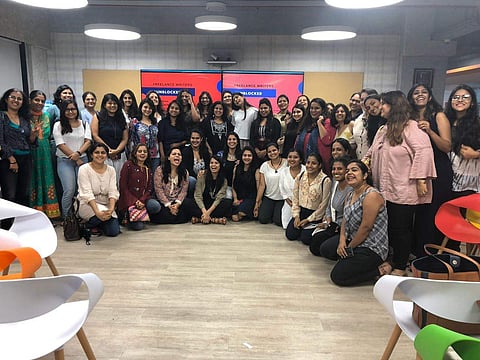

Over the past few decades, we have seen increased participation of women in the workforce. But it's not quite enough — only 10 per cent of the women in India are part of the labour force, says the latest data from CMIE. To bridge that chasm, Kool Kanya, a career consultancy platform, is helping women create a career that they love and keeping everything online.
The platform consists of content, community and a marketplace, said Vanshika Goenka, Founder of Kool Kanya. "Content ranges from topics such as starting out, how to write a resume, finding a job and so on to detailed resume templates and videos on navigating careers. The community is a space for users to ask questions, attend events hosted by experts and connect with peers. The curated marketplace allows users to enroll as freelancers for skills like resume writing, marketing or designing. We are working towards building an ecosystem for everything to do with a woman’s career. Till date, we have over 300,000 monthly active users," added 26-year-old Vanshika.
The pandemic has changed the way we looked at employment. Distance is not a barrier anymore. being in a Tier-2 city is not a disadvantage. "Cities no longer matter. More people are able to find work outside their hometowns without the burden of a move. Additionally, we have seen more people looking for freelance work, or a side hustle to supplement their income given the uncertainty of the job market. We have also seen that people are starting to work more efficiently from home, and companies have also started to trust their employees to work from home effectively," said Vanshika.
But Kool Kanya remains a niche product which only the English-speaking Indians can avail. But Vanshika and her team have plans to expand as well to reach the 'next half billion'. "As a product, our platform is in English and is tailored for 18 to 30-year-olds in India. Today we are only starting with English but soon we will be adding Hindi and other regional languages to cater to the needs of the next half billion," she added.
Vanshika graduated in 2016 from Brown University with a Bachelors in Political Science with Magna Cum Laude, Pi Sigma Alpha and Pi Beta Kapha. But why come back to India to help others? "I have always been passionate about helping women. But what motivated me to start Kool Kanya was when I was working with a sanitary pad company where we were looking at redesigning sanitary pads. I remember looking around the room and seeing only men. It was then that I started delving into the skewed ratio, questions like why are there fewer women leaders and why do women drop out of the workforce," she explained.
The change that initiatives like Kool Kanya envision is a slow one and it will take time for society to accept women in leadership roles. "We have witnessed a lot of change in India over the past two decades. From social media networks to large conglomerates - women have grown into leadership roles across the spectrum in corporate India. However with that being said - it does take time for change to percolate down through the entire population," said Vanshika. "I believe that India is constantly evolving and welcoming women into the workforce. In the short term however we need to show more female role models in workplaces and need to support women with access to mentorship and guidance early on and through their career," she added.
But things have changed over the years, said Vanshika and added, "Even though women have been neglected from the workforce because of the underlying belief that women will leave the workforce to raise a family or when they experience life changes like marriage, in the current day and age we are moving towards two-income households where both partners play an important role in raising kids more women want to work. But workplaces need to offer more support to women in the form of flexibility, leadership training and role models," she said.
